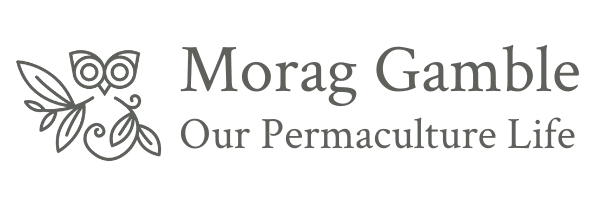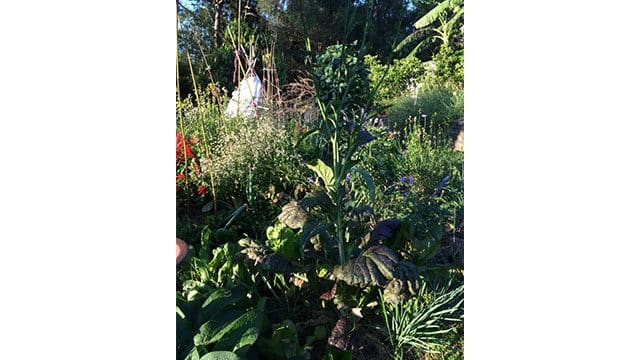I have been exploring ways to cut out plastic wrapping in my household. The obvious way to do this is to not buy it. So where do I get all my food?
Firstly, my garden – there is so much abundance there if you include all the edible leaves, flowers, roots, fruits and shoots. Secondly, I source a fair amount by trading with friends and visiting local farmers, markets and my local food coop.
Wild foraging is another way of getting package-free food – it’s fresh and it’s free. Everywhere there is actually so much food. Street trees, parks, river banks, pathways, community gardens and abandoned spaces. Around here there are wild raspberries, dandelions, nettle, chickweed, wild amaranth, purslane and so much more.
One of my favourite parts of workshops I run is walking around the garden foraging for food. We smell, taste and collect things that usually get overlooked – I talk about how to grow, harvest and cook the unusual foods. I’ve also organised workshops too where we go on a wild forage for weeds and feast on our findings for lunch.
Since my garden is such a source of foraging abundance, I haven’t been wild foraging for a while but I am re-inspired to head out to the wilder parts after coming across a great book yesterday about foraging for wild food in the city. The Thrifty Forager: Living off your local landscape by Alys Fowler 2011, and a new edition in 2015.
In the introduction to The Thrifty Forager, Alys addresses straight up the fear that people have of foraging for food – “Is it clean?” She answers this by questioning whether supermarket food is any cleaner, suggesting that it is possibly more polluted. She encourages people to become “competent foragers – knowing the land management practices of where the food is being picked – knowing what and when to pick, observing the landscape and watching for changes”. She believes that what she picks from around her is far more beneficial to her and her surroundings that anything she buys about of a package.
When I lived in Brisbane, we were always foraging. We harvested Macadamias from our street trees, tamarinds from another road lined with them, fallen mangoes, lilly pillies from parks everywhere, and lots of other bush foods.
Another really useful book I have for finding out what to look for is the Weed Forager’s Handbook: A guide to edible and medicinal weeds in Australia by Adam Grubb and Annie Raser-Rowland.
There’s also Food for Free by Richard Mabey. Collins 2012, which lists over 100 common foods you can find out and about.
At the same time that I found The Thrifty Forager, I saw The Rurbanite: living in the country without leaving the city (2013) by Alex Mitchell (also author of The Edible Balcony, and a columnist for the Sunday Telegraph). I related to being a ‘rurbanite’. This is how I felt as a city farmer – getting Northey Street City Farm set up 20 years ago. I remember actually being referred to as an ‘Urban Peasant’ in a newspaper article with a picture of me in my overalls with a garden fork over my shoulder.
The Rurbanite is a good read for people who want to live grow food, keep chickens and bees, live simply, but stay in the city. There’s a growing band of urbanites – the urban homesteaders, the city farmers, container growers, curbside gardeners, urban food foragers and guerrilla gardeners. With 75% of the global population expected to live in cities by 2050, growing food in the city, and connecting with and nurturing the natural and wild spaces in the cities is becoming more and more critical.




I hadn't heard of the Rurbanite book, Morag. I hope my library has a copy!
Back in the UK as a girl we went "blackberrying" each autumn and made delicious blackberry and apple jam, and pies. Even as a child I got excited about free food. My mother used to forage wild stuff to make wine. Nettles, elderflower, you name it. Blew your head off judging by the giggling going on amongst my aunties once they had a glass.
I would love to go wild foraging in Brisbane but need to know where to start. I thought there was a wild foraging group in West End one time. Do you know of anybody in Brisbane who runs this sort of thing?
What great childhood memories. I have also heard of the wild foraging group but don't have their contact – will ask around and let you know.
Blackberries – mmmm! Luck you! I grew up in that area of Melbourne and remember being so disappointed at not being able to harvest the berries because of the sprays.
I live in an outer eastern suburb of Melbourne and have a lovely unsprayed blackberry patch half a kilometer up the road. I have probably picked over 20kg of blackberries and turned them into jam and cordial as well as a few for eating. Based on a well known supermarkets per kilo price of $31.20 I have foraged over $600 of organic, fresh, local, sweet & tasty fruit.
I have prepared labels for the jam that say it is foraged fruit.
I have yet to persuade myself to eat foraged weeds despite reading the weed book by Adam (who I know)
Claire